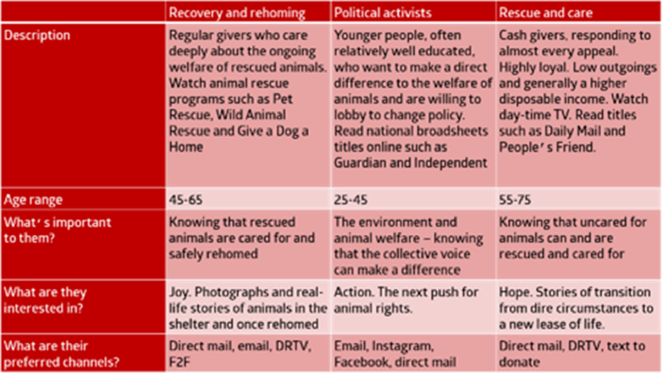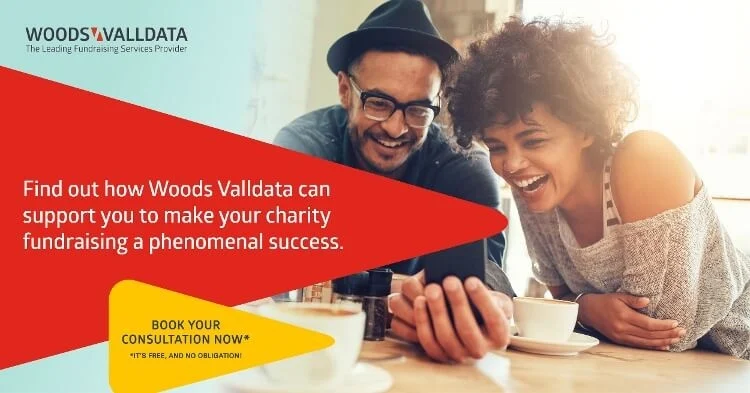
How to develop charity supporter personas to gain long-term benefits
Understanding your charity donors’ needs and motivations, and the charity supporter journey, will help you to build lasting, positive relationships.
Individualised experiences are no longer exclusive to e-commerce and entertainment giants. Relevant content which resonates with the individual is becoming an expectation, and is a way for charities to improve donor relationships and retention. Your starting place to do this is with your data and understanding who your audience is with supporter personas.
It’s no surprise that donor-centric messaging is so effective. In a survey by Salesforce, it was found that 84% of respondents say being treated like an individual, not a statistic, has a crucial influence on our choice to support a brand.
We want to feel understood, to the extent that, according to Accenture, 83% of us are willing to share our data for more personalised experiences.
So, how do you get to know your donors? What exactly are personas? How do you make donors feel directly addressed? Where should you begin? Read on to find out...

7 steps to developing your supporter personas and understanding the charity supporter journey...
1. Use data to categorize your supporter segments
We know this all too well in the third sector: supporters are wide-ranging in age, background and gifting behaviours. There’s lots of ways to classify supporters, a few common groups are Gen Z, swing donors, core supporters, baby boomers, and high net worth individuals.
As an example, we have a blog which specifically talks about the range of supporters who play a charity raffle!
2. Ask them what their needs and motivations are
After you’ve analysed your supporter base and established your target groups, we suggest you think about the individuals within them.
Try to get acquainted with who they are, what makes them tick, their hopes, fears, and needs, their values and aspirations.
You could work with specialist agencies to support with this, or simply ask your donors by survey – you might be surprised at the response. People feel valued when asked their opinion!
3. Build a persona for each segment
This is how you can start to establish your supporter “personas.”
Fictional personas are often created by marketing departments to help everyone in the organisation understand and empathise with the different types of donors.
Chloë Amstein at the IoF 2020 Convention talked about “Stop seeing donors, start seeing people.” It’s the person you’re writing to, or addressing, when creating your individual giving plan.

4. Make messages relevant
Once you’ve whittled down your supporter personas, you can start honing communications that make your supporters feel seen and appreciated. You can tap into their emotions directly, rather than releasing broad hit-and-miss content.
For example, say you’re an animal welfare charity, you’ve found that some of your supporters are motivated by the recovery of mistreated animals and are interested in their story, others are passionate about lobbying for animal rights and others are interested in rescue stories.
The way you talk to these supporter groups would be different based on their interests (see the above table). You can then overlay their recency, frequency and value to determine ask and frequency strategies.
Value exchange is critical because it strengthens supporter retention. In fact, a whopping 70% of people according to Salesforce say a company’s understanding of our unique needs shapes our sense of loyalty.
5. Plan, plan, plan
Now you’ve identified your supporter personas, you can begin mapping out how you will engage them at each touchpoint in their charity supporter journey.
Save the Children, for example, “don’t have a fundraising strategy, they have a supporter engagement strategy” explains Peter Ashcroft, Director of Change, Save the Children at the IoF 2020 Convention.
From the initial point of engagement right through to response a pre-planned, segmented strategy helps ensure you deliver compelling, relevant messaging.
6. Take action!
By taking advantage of the incredible technology that is thankfully now available for both print and digital, you can address your different personas with the right messaging at the right time.
Direct mail continues to sway demographics of all age groups. It makes for a great partner with digital, where segmented email marketing with variable content blocks, targeted social media campaigns and personalised advertising can be used.

7. Test and refine
Once you have your supporter engagement strategy in place, you can consider A/B testing to make messaging as persuasive as possible. Tailor your approach, monitor the results, then tailor it some more!
To find out how Woods Valldata can help you craft impactful charity supporter journeys, please get in touch.
Customisation sits at the core of Woods Valldata’s response handling and thanking services. Using our SmartThank platform, we enable you to create personalised communications without multiple letter set-ups.
We will also help you collect supporter preference data quickly and easily with hierarchical linked tick boxes as standard in our system.
Our unique platform is flexible and configurable to most campaign requirements meaning you can make each stage in the supporter journey feel personal. Options include the following:
- Tailored communications based on segments, matrices, and automated trigger points, so you can adapt the theme and timing of content accordingly.
- Variable text, phrasing and high-quality imagery meaning welcome and fulfilment packs are personalised to your donor, alongside machine and hand matching for multiple personalised items.
- Fully personalised cards for thanking from printed handwritten scripts, top and tail salutations and complete handwritten statements.
What’s more, to get the best out of your campaigns our on-demand printing, and email thanking, enables quick testing of different wording and calls to action. That means you can see which response works best before you roll out the rest (LOL – that rhymes!)
Want to learn more about our Response Handling services?
Visit our dedicated Response Handling service page or get in touch with our team today. We’d be delighted to hear from you!
Categories
- charity fundraising (55)
- Income Generation for Charities (43)
- Lottery (41)
- Raffle (37)
- Appeal response handling (33)
- Response Handling (31)
- fundraising insights (24)
- charity gaming (20)
- Fulfilment (18)
- charity insights (17)
- charity raffle (17)
- Compliance (12)
- creating a fundraising strategy (12)
- Company News (11)
- benchmarks (10)
- Direct Debit (9)
- Services (8)
- Gambling Act (5)
- supporter experience (1)
Archives
- March 2020 (5)
- May 2022 (4)
- October 2022 (4)
- January 2023 (4)
- June 2023 (4)
- May 2024 (4)
- June 2024 (4)
- January 2026 (4)
- March 2021 (3)
- April 2021 (3)
- July 2023 (3)
- August 2023 (3)
- April 2024 (3)
- July 2024 (3)
- November 2025 (3)
- June 2020 (2)
- August 2020 (2)
- October 2020 (2)
- November 2020 (2)
- November 2021 (2)
- January 2022 (2)
- February 2022 (2)
- February 2023 (2)
- March 2023 (2)
- September 2023 (2)
- December 2023 (2)
- February 2024 (2)
- March 2024 (2)
- February 2025 (2)
- July 2025 (2)
- December 2025 (2)
- June 2015 (1)
- November 2017 (1)
- February 2020 (1)
- April 2020 (1)
- May 2020 (1)
- July 2020 (1)
- September 2020 (1)
- May 2021 (1)
- June 2021 (1)
- August 2021 (1)
- September 2021 (1)
- October 2021 (1)
- December 2021 (1)
- March 2022 (1)
- April 2022 (1)
- June 2022 (1)
- July 2022 (1)
- August 2022 (1)
- September 2022 (1)
- December 2022 (1)
- May 2023 (1)
- October 2023 (1)
- November 2023 (1)
- January 2024 (1)
- September 2024 (1)
- January 2025 (1)
- March 2025 (1)
- September 2025 (1)
- October 2025 (1)
- February 2026 (1)

